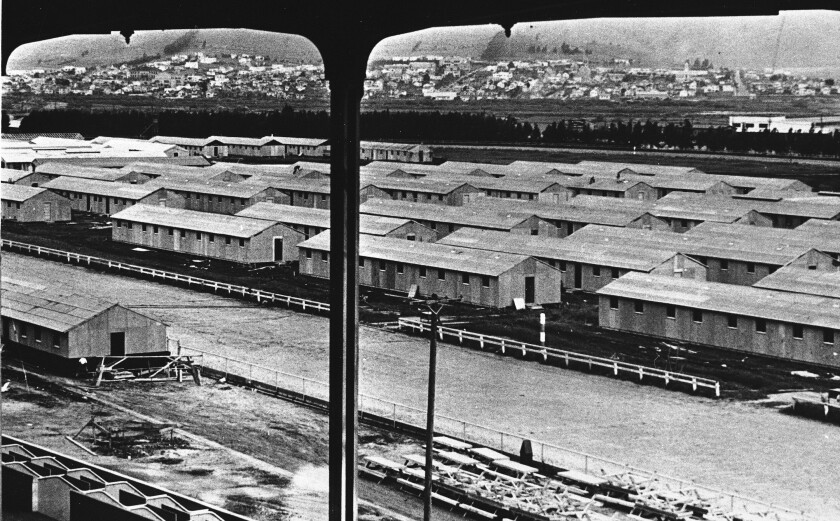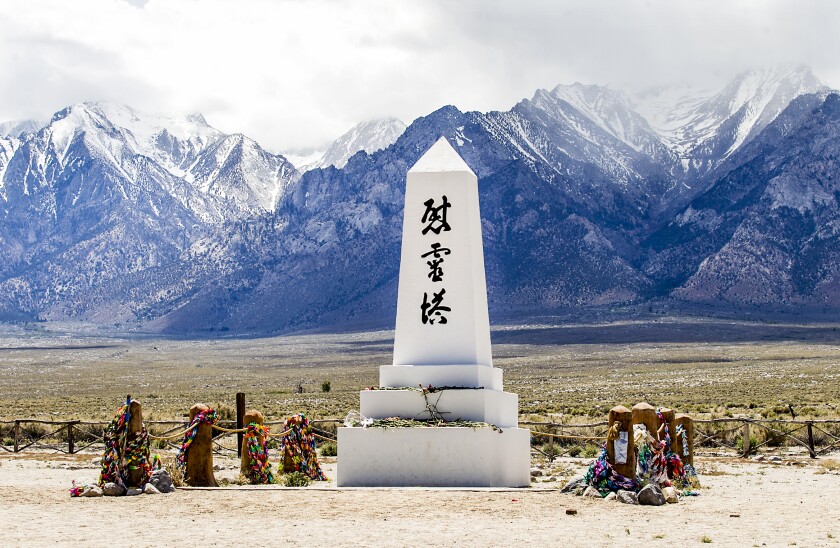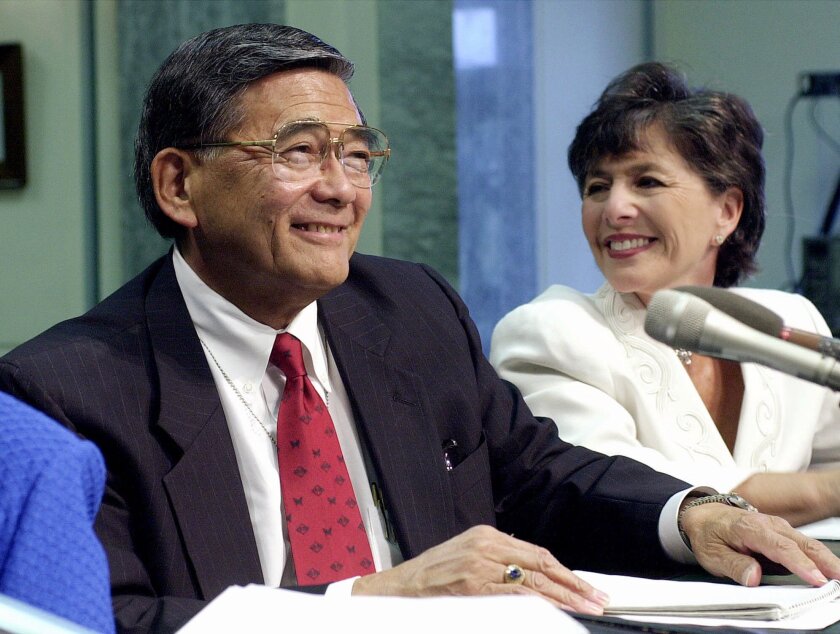‘We were robbed’: Norman Mineta’s long quest for justice for Japanese Americans
4 min read
Table of Contents
Norman Mineta was 10 yrs outdated when he and his household were being taken in 1942 from their property in San Jose to a jail camp founded at the Santa Anita racetrack.
He was just one of 120,000 people today of Japanese ancestry who have been purchased to the Planet War II camps. Mineta, who died Tuesday, went on to come to be a highly effective congressman from San Jose and provide in the cabinets of two presidents.
But possibly his best legacy was his long struggle to win congressional acceptance of legislation — afterwards signed in 1988 by then-President Reagan — expressing a countrywide apology and giving a $20,000 tax-free of charge payment to every survivor of the incarceration camps.
Here’s a look at his initiatives from the web pages of The Moments:

An undated image reveals the Japanese incarceration camp at Tanforan, Calif.
(Involved Press)
Incarceration
All people of Japanese ancestry living on the West Coastline ended up rounded up and despatched to 1 of 10 incarceration camps in the western United States and Arkansas less than a 1942 executive purchase signed by President Franklin D. Roosevelt. Regardless of arguments that the purchase violated the constitutional legal rights of people despatched to the camps without having any cost or demo, the U.S. Supreme Court docket ruled in 1944 the action was within the president’s powers as commander-in-main in wartime.
In 1980, a special fee was produced to study the situation. It proposed that payment be compensated, concluding that the mass incarceration was based mostly on war hysteria and racial prejudice. No comparable action was taken against Individuals of German or Italian ancestry, despite the fact that the United States also was at war with individuals two countries.
Mineta regularly spoke of his family’s encounters in the camp, which started out with the 345-mile educate ride from his home in San Jose to a momentary assembly heart at the Santa Anita racetrack.
“We were being lucky simply because … we have been not in the horse stables,” Mineta claimed. “We were being in barracks … that had been crafted. I remember going to visit friends … in the horse stables for the duration of the warm months of the summer season. They might have swept out the horse stables, but the stench was continue to there. How, frankly, they lived in these, I’ll by no means fully grasp.”

The Manzanar War Relocation Centre.
(Don Leach / Each day Pilot)
Combat for justice
Mineta — along with a few other Japanese American congressional leaders: Robert T. Matsui, Daniel K. Inouye and Spark M. Matsunaga — proposed that the redress marketing campaign 1st begin with a national fee to look into the variables that led to the incarceration. Some Japanese American activists disagreed, declaring the approach would acquire too extended and pressed as an alternative for laws to instantly award payment, but Mineta and other individuals argued that a commission course of action would be far more politically productive to finally win reparations.
At to start with, there was important opposition in Congress, with just one Republican congressman from California stressing it would swell the deficit and open up the doorway for reparations for Native Us citizens.
Mineta turned down the critics forcefully. “We had been robbed,” he said in 1986, “just as if agents of the authorities had crept into our properties at night time and taken our liberty, our rights and our assets. There is no statute of limits on our disgrace, our damaged honor or our violated rights. It has fallen on this (Congress) to set us no cost.”
The day Congress handed the invoice, he spoke about the historical past currently being designed. “This legislation touches all of us because it goes to the extremely main of our country,” Mineta reported. “I am deeply honored to provide in this system as it can take the terrific step of admitting and redressing a monumental injustice.”
The monthly bill, whose total cost tag was $1.25 billion, passed by a vote of 257 to 156.
“This was a working day of reckoning for the Property on the challenge of redress,” Matsui, a Democrat from Sacramento, stated at the time. “I think about the outcome a main victory not only for those who were interned but for the region. It is clear now that Congress has lived up to its moral obligation.”

Previous Rep. Norman Mineta (D–San Jose) seems at a July 2000 Senate Commerce Committee listening to on his nomination to be secretary of commerce. Sen. Barbara, Boxer (D–Calif.) is at suitable.
(Involved Push)
A legacy
In 1988, Reagan signed the bill into law. “We gather listed here these days to ideal a grave improper,” reported Reagan, citing the hardships endured by Mineta.
“No payment can make up for those people dropped years,” Reagan stated. “So what is essential in this bill has much less to do with house than with honor, for below, we admit a completely wrong. Listed here we reaffirm our dedication as a nation to equivalent justice less than the legislation.”
A calendar year later, the first payments went out.
“In the annals of civilization, there aren’t many scenarios of a governing administration apologizing this way,” Mineta stated. “Here we have a federal government indicating, ‘We have been wrong, we apologize.’ It is just exhilarating to see these factors occurring.”
Further more looking through:






